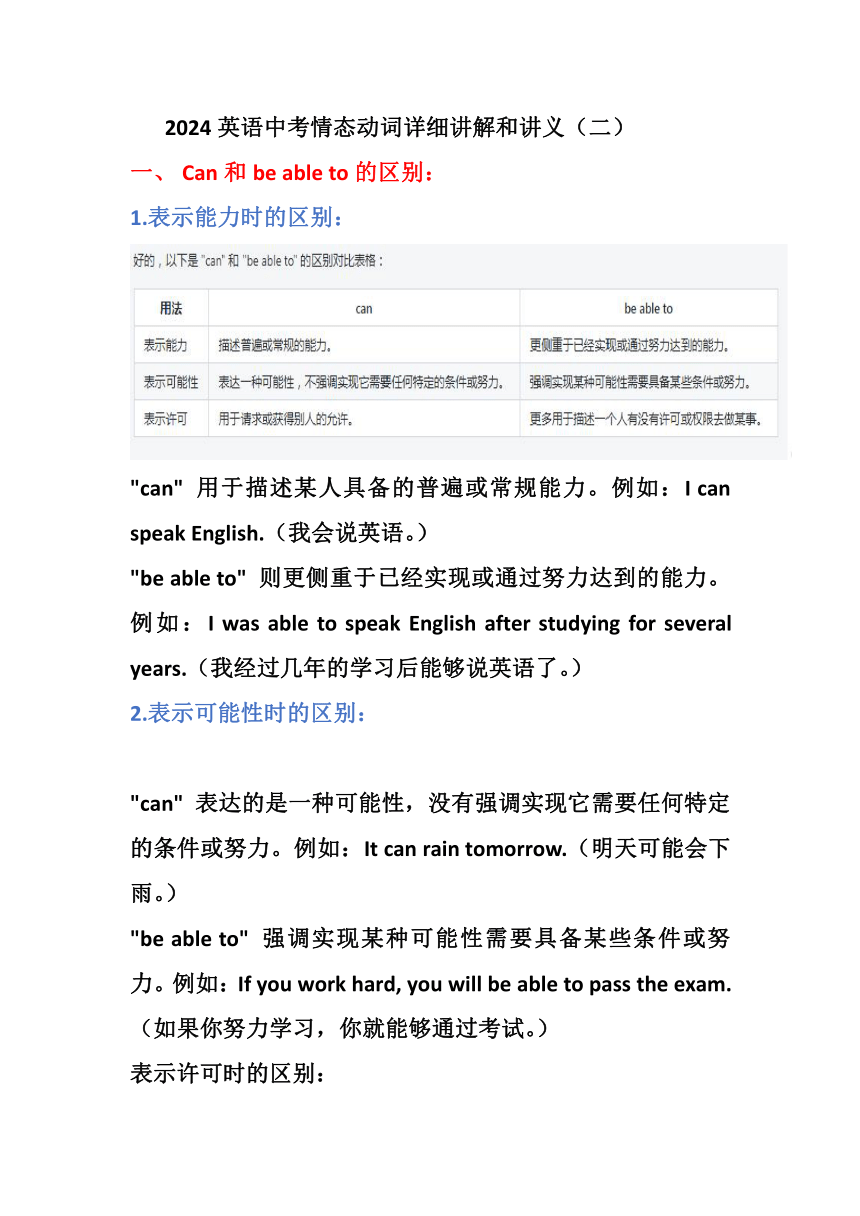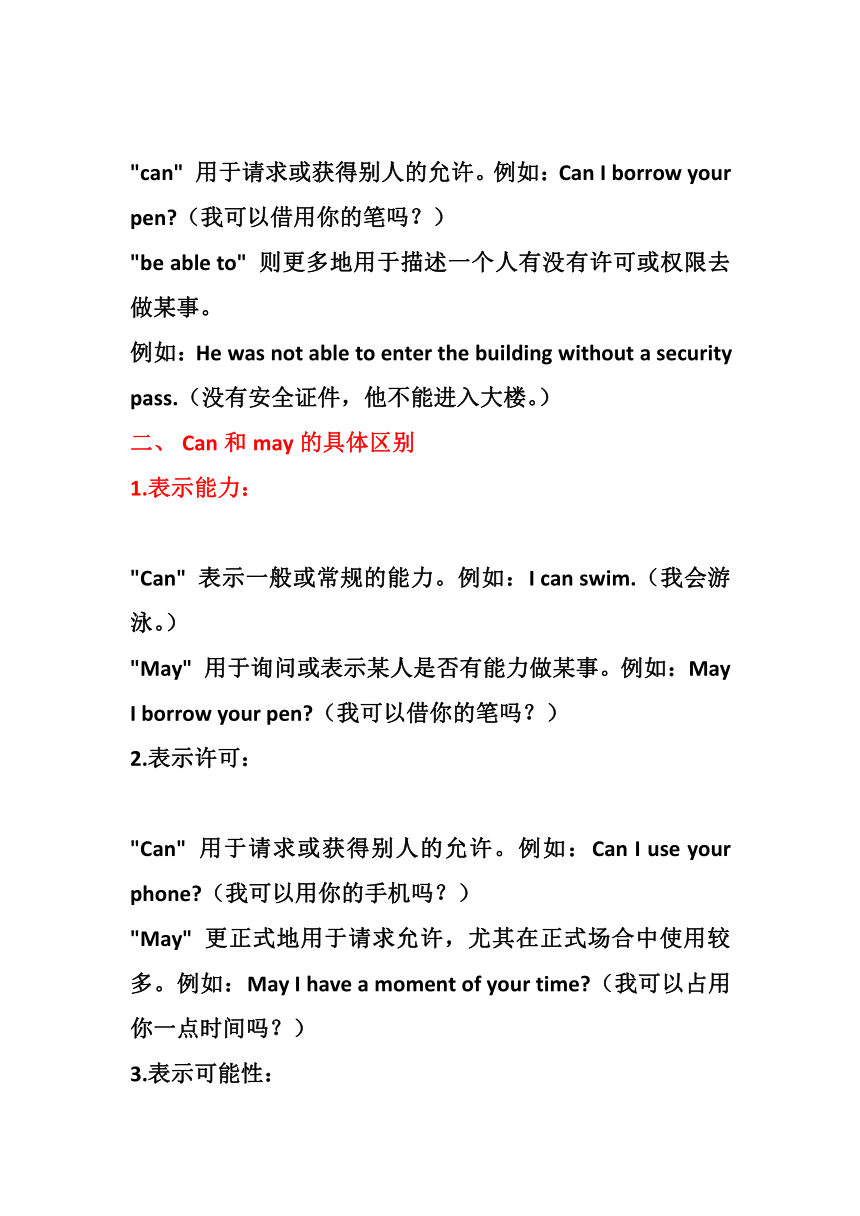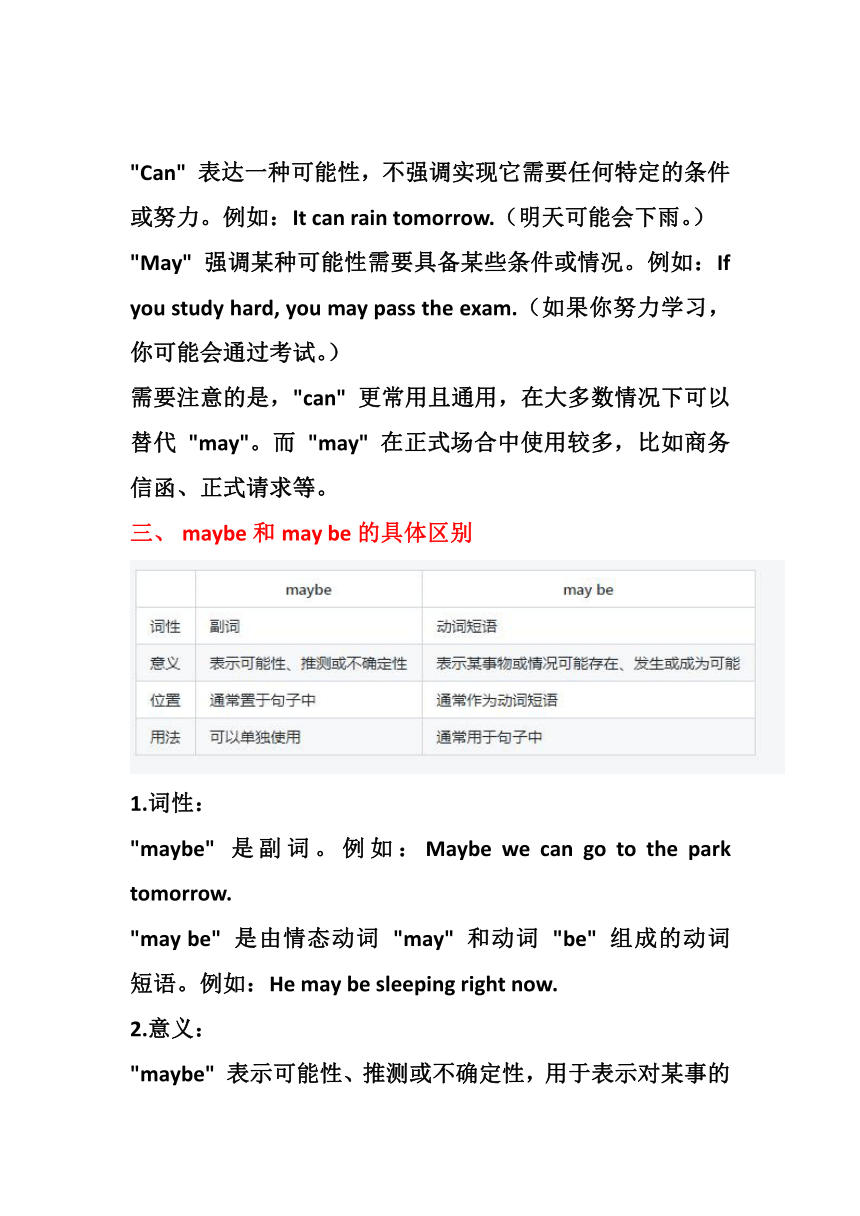2024年英语中考情态动词详细讲解和讲义(二)
文档属性
| 名称 | 2024年英语中考情态动词详细讲解和讲义(二) |  | |
| 格式 | docx | ||
| 文件大小 | 86.8KB | ||
| 资源类型 | 教案 | ||
| 版本资源 | 通用版 | ||
| 科目 | 英语 | ||
| 更新时间 | 2024-01-21 10:02:25 | ||
图片预览




文档简介
2024英语中考情态动词详细讲解和讲义(二)
Can和be able to的区别:
1.表示能力时的区别:
"can" 用于描述某人具备的普遍或常规能力。例如:I can speak English.(我会说英语。)
"be able to" 则更侧重于已经实现或通过努力达到的能力。例如:I was able to speak English after studying for several years.(我经过几年的学习后能够说英语了。)
2.表示可能性时的区别:
"can" 表达的是一种可能性,没有强调实现它需要任何特定的条件或努力。例如:It can rain tomorrow.(明天可能会下雨。)
"be able to" 强调实现某种可能性需要具备某些条件或努力。例如:If you work hard, you will be able to pass the exam.(如果你努力学习,你就能够通过考试。)
表示许可时的区别:
"can" 用于请求或获得别人的允许。例如:Can I borrow your pen (我可以借用你的笔吗?)
"be able to" 则更多地用于描述一个人有没有许可或权限去做某事。
例如:He was not able to enter the building without a security pass.(没有安全证件,他不能进入大楼。)
Can和may的具体区别
1.表示能力:
"Can" 表示一般或常规的能力。例如:I can swim.(我会游泳。)
"May" 用于询问或表示某人是否有能力做某事。例如:May I borrow your pen (我可以借你的笔吗?)
2.表示许可:
"Can" 用于请求或获得别人的允许。例如:Can I use your phone (我可以用你的手机吗?)
"May" 更正式地用于请求允许,尤其在正式场合中使用较多。例如:May I have a moment of your time (我可以占用你一点时间吗?)
3.表示可能性:
"Can" 表达一种可能性,不强调实现它需要任何特定的条件或努力。例如:It can rain tomorrow.(明天可能会下雨。)
"May" 强调某种可能性需要具备某些条件或情况。例如:If you study hard, you may pass the exam.(如果你努力学习,你可能会通过考试。)
需要注意的是,"can" 更常用且通用,在大多数情况下可以替代 "may"。而 "may" 在正式场合中使用较多,比如商务信函、正式请求等。
maybe和may be的具体区别
1.词性:
"maybe" 是副词。例如:Maybe we can go to the park tomorrow.
"may be" 是由情态动词 "may" 和动词 "be" 组成的动词短语。例如:He may be sleeping right now.
2.意义:
"maybe" 表示可能性、推测或不确定性,用于表示对某事的猜测或估计。例如:Maybe it will rain today.
"may be" 表示某物或情况的可能性或存在性,用于表示某事的可能性。例如:It may be true that he is coming tomorrow.
3.位置:
"maybe" 通常位于句子中,作为副词修饰整个句子或谓语动词。例如:I maybe can't come to the party tonight.
"may be" 通常作为动词短语,位于主语和谓语动词之间。例如:She may be a doctor in the future.
4.用法:
"maybe" 可以单独使用,放在句首或句中,表示可能性。例如:Maybe he will come later.
"may be" 通常作为动词短语出现,用于表示某事的可能性。例如:That may be the solution.
四、Can't 和 mustn't的区别
1."can't" 表示不能或不可能做某事,通常是由于某种客观原因:
I can't come to the party tonight.
(今晚我不能来参加聚会。)
The store can't sell alcohol to minors.
(店铺不能向未成年人出售酒类产品。)
2."mustn't" 表示不允许或禁止做某事,通常是由于规定、法律、道德等方面的原因:
You mustn't cheat on the exam.
(考试中你不能作弊。)
Passengers mustn't smoke on the plane.
(乘客在飞机上不能吸烟。)
可以看出,“can't” 是因为某些客观的原因导致不能做某事,而“mustn't” 则是因为规定、法律、道德等方面的原因而不允许做某事。
五:Must和have to的区别:
1."must" 表示某事非常重要、必须遵守或是说话人的强烈建议,通常强调个人的意志、责任或者规定:
You must wear a helmet while riding a motorcycle.(骑摩托车时必须戴头盔。)
I must finish this project by the end of the week.
(我必须在本周末完成这个项目。)
You must come visit us when you're in town.
(你来城里一定要来看我们。)
2."have to" 表示因为某种原因而需要做某事,比如规定、法律、约定等,通常强调客观必要性和外部压力:
Employees have to attend the meeting.
(员工们必须参加会议。)
We have to wear formal clothes to the party.
(我们去派对必须穿正装。)
I have to take the bus because my car is in the repair shop.
(我必须坐公交车,因为我的车在修理店。)
可以看出, "must" 强调的是个人主观意愿或某种约束,而 "have to" 则强调外部客观的需要或规定。
六、Would should could might的用法:
2.Would
表示过去经常发生或习惯上会发生的事情:I would always eat breakfast before going to work.
(我过去总是在去工作之前吃早餐。)
用于表示礼貌的请求:
Would you mind passing me the salt
(请问你能递给我盐吗?)
表示意愿、假设或推测:
I would like to visit Paris someday.
(我希望有一天能够去巴黎。)
2.Should
表示义务、建议或期望:
You should study hard for your exams.
(你应该好好准备考试。)
表示假设或推测:
He should be here by now.
(他现在应该已经到了。)
3.Could
表示能力、可能性或请求的礼貌:I could speak French when I was younger.(我年轻的时候会说法语。)
Could you please help me with my bags?
(你能帮我拿一下行李吗?)
Might
表示可能性或推测:It might rain later.(天气可能会转雨。)
用于婉转地提出建议或请求:You might want to consider taking a break.(你可以考虑休息一下。)
六、Used to do, be used to doing,.be used to do.用法:
1.Used to do:
I used to play soccer when I was younger.
(我小时候经常踢足球。)
She used to live in Paris before moving to London.
(她以前住在巴黎,后来搬到了伦敦。)
2.Be used to doing:
I am used to waking up early in the morning.
(我习惯早上早起。)
They are used to working long hours.
(他们习惯做长时间的工作。)
3.Be used to do:
The old factory is now used to produce environmentally friendly products.
(这家旧工厂现在被用来生产环保产品。)
The meeting room will be used to host important conferences.(会议室将被用来举办重要的会议。)
Can和be able to的区别:
1.表示能力时的区别:
"can" 用于描述某人具备的普遍或常规能力。例如:I can speak English.(我会说英语。)
"be able to" 则更侧重于已经实现或通过努力达到的能力。例如:I was able to speak English after studying for several years.(我经过几年的学习后能够说英语了。)
2.表示可能性时的区别:
"can" 表达的是一种可能性,没有强调实现它需要任何特定的条件或努力。例如:It can rain tomorrow.(明天可能会下雨。)
"be able to" 强调实现某种可能性需要具备某些条件或努力。例如:If you work hard, you will be able to pass the exam.(如果你努力学习,你就能够通过考试。)
表示许可时的区别:
"can" 用于请求或获得别人的允许。例如:Can I borrow your pen (我可以借用你的笔吗?)
"be able to" 则更多地用于描述一个人有没有许可或权限去做某事。
例如:He was not able to enter the building without a security pass.(没有安全证件,他不能进入大楼。)
Can和may的具体区别
1.表示能力:
"Can" 表示一般或常规的能力。例如:I can swim.(我会游泳。)
"May" 用于询问或表示某人是否有能力做某事。例如:May I borrow your pen (我可以借你的笔吗?)
2.表示许可:
"Can" 用于请求或获得别人的允许。例如:Can I use your phone (我可以用你的手机吗?)
"May" 更正式地用于请求允许,尤其在正式场合中使用较多。例如:May I have a moment of your time (我可以占用你一点时间吗?)
3.表示可能性:
"Can" 表达一种可能性,不强调实现它需要任何特定的条件或努力。例如:It can rain tomorrow.(明天可能会下雨。)
"May" 强调某种可能性需要具备某些条件或情况。例如:If you study hard, you may pass the exam.(如果你努力学习,你可能会通过考试。)
需要注意的是,"can" 更常用且通用,在大多数情况下可以替代 "may"。而 "may" 在正式场合中使用较多,比如商务信函、正式请求等。
maybe和may be的具体区别
1.词性:
"maybe" 是副词。例如:Maybe we can go to the park tomorrow.
"may be" 是由情态动词 "may" 和动词 "be" 组成的动词短语。例如:He may be sleeping right now.
2.意义:
"maybe" 表示可能性、推测或不确定性,用于表示对某事的猜测或估计。例如:Maybe it will rain today.
"may be" 表示某物或情况的可能性或存在性,用于表示某事的可能性。例如:It may be true that he is coming tomorrow.
3.位置:
"maybe" 通常位于句子中,作为副词修饰整个句子或谓语动词。例如:I maybe can't come to the party tonight.
"may be" 通常作为动词短语,位于主语和谓语动词之间。例如:She may be a doctor in the future.
4.用法:
"maybe" 可以单独使用,放在句首或句中,表示可能性。例如:Maybe he will come later.
"may be" 通常作为动词短语出现,用于表示某事的可能性。例如:That may be the solution.
四、Can't 和 mustn't的区别
1."can't" 表示不能或不可能做某事,通常是由于某种客观原因:
I can't come to the party tonight.
(今晚我不能来参加聚会。)
The store can't sell alcohol to minors.
(店铺不能向未成年人出售酒类产品。)
2."mustn't" 表示不允许或禁止做某事,通常是由于规定、法律、道德等方面的原因:
You mustn't cheat on the exam.
(考试中你不能作弊。)
Passengers mustn't smoke on the plane.
(乘客在飞机上不能吸烟。)
可以看出,“can't” 是因为某些客观的原因导致不能做某事,而“mustn't” 则是因为规定、法律、道德等方面的原因而不允许做某事。
五:Must和have to的区别:
1."must" 表示某事非常重要、必须遵守或是说话人的强烈建议,通常强调个人的意志、责任或者规定:
You must wear a helmet while riding a motorcycle.(骑摩托车时必须戴头盔。)
I must finish this project by the end of the week.
(我必须在本周末完成这个项目。)
You must come visit us when you're in town.
(你来城里一定要来看我们。)
2."have to" 表示因为某种原因而需要做某事,比如规定、法律、约定等,通常强调客观必要性和外部压力:
Employees have to attend the meeting.
(员工们必须参加会议。)
We have to wear formal clothes to the party.
(我们去派对必须穿正装。)
I have to take the bus because my car is in the repair shop.
(我必须坐公交车,因为我的车在修理店。)
可以看出, "must" 强调的是个人主观意愿或某种约束,而 "have to" 则强调外部客观的需要或规定。
六、Would should could might的用法:
2.Would
表示过去经常发生或习惯上会发生的事情:I would always eat breakfast before going to work.
(我过去总是在去工作之前吃早餐。)
用于表示礼貌的请求:
Would you mind passing me the salt
(请问你能递给我盐吗?)
表示意愿、假设或推测:
I would like to visit Paris someday.
(我希望有一天能够去巴黎。)
2.Should
表示义务、建议或期望:
You should study hard for your exams.
(你应该好好准备考试。)
表示假设或推测:
He should be here by now.
(他现在应该已经到了。)
3.Could
表示能力、可能性或请求的礼貌:I could speak French when I was younger.(我年轻的时候会说法语。)
Could you please help me with my bags?
(你能帮我拿一下行李吗?)
Might
表示可能性或推测:It might rain later.(天气可能会转雨。)
用于婉转地提出建议或请求:You might want to consider taking a break.(你可以考虑休息一下。)
六、Used to do, be used to doing,.be used to do.用法:
1.Used to do:
I used to play soccer when I was younger.
(我小时候经常踢足球。)
She used to live in Paris before moving to London.
(她以前住在巴黎,后来搬到了伦敦。)
2.Be used to doing:
I am used to waking up early in the morning.
(我习惯早上早起。)
They are used to working long hours.
(他们习惯做长时间的工作。)
3.Be used to do:
The old factory is now used to produce environmentally friendly products.
(这家旧工厂现在被用来生产环保产品。)
The meeting room will be used to host important conferences.(会议室将被用来举办重要的会议。)
同课章节目录
- 词法
- 名词
- 动词和动词短语
- 动词语态
- 动词时态
- 助动词和情态动词
- 非谓语动词
- 冠词
- 代词
- 数词和量词
- 形容词副词及其比较等级
- 介词和介词短语
- 连词和感叹词
- 构词法
- 相似、相近词比较
- 句法
- 陈述句
- 一般疑问句和否定疑问句
- 特殊疑问句及选择疑问句
- 反意疑问句
- 存在句(There be句型)
- 宾语从句
- 定语从句
- 状语从句
- 主谓一致问题
- 简单句
- 并列句
- 复合句
- 主谓一致
- 主、表语从句
- 名词性从句
- 直接引语和间接引语
- 虚拟语气
- 感叹句
- 强调句
- 倒装句
- 祈使句
- 句子的成分
- 句子的分类
- 题型专区
- 单项选择部分
- 易错题
- 完形填空
- 阅读理解
- 词汇练习
- 听说训练
- 句型转换
- 补全对话
- 短文改错
- 翻译
- 书面表达
- 任务型阅读
- 语法填空
- 其他资料
